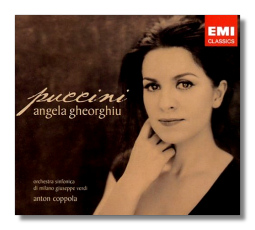
The Internet's Premier Classical Music Source
Related Links
- Puccini Reviews
- Latest Reviews
- More Reviews
-
By Composer
-
Collections
DVD & Blu-ray
Books
Concert Reviews
Articles/Interviews
Software
Audio
Search Amazon
Recommended Links
Site News
 CD Review
CD Review
Giacomo Puccini

Arias from:
- Madama Butterfly *
- Edgar **
- La rondine
- La Bohème
- La fanciulla del West
- Manon Lescaut
- Suor Angelica
- Gianni Schicchi
- Le villi
- Turandot *
Angela Gheorghiu, soprano
* Roberto Alagna, tenor
** Chorus of the Royal Opera House, Covent Garden
Orchestra Sinfonica di Milano, Giuseppe Verdi/Anton Coppola
EMI Classics 5 57955-0 DDD 70:39
Having recorded an album of Verdi arias several years ago, it was only a matter of time before Angela Gheorghiu did the same for Puccini. The results are equally superlative. In the 1950s and 60s, the sopranos who could (and did) release an album like this one were legion. Today, who besides Gheorghiu could pull it off, sad to say? Only a few, and probably none of them could reach the level achieved here. Apart from a few high notes that could have been better integrated with the rest of the voice (at the end of "Un bel dì," for example), Gheorghiu's singing is technically secure, and her sound – a little dark, soulful, and quivering with life – remains both striking and memorable. She is a better than average interpreter, too. One can hear the emotional and physical exhaustion in Mimi's "Donde lieta uscì" and the desperation in Manon Lescaut's "Sola, perduta, abbandonata." (On the other hand, there's not enough gaiety in Musetta's Waltz Song, and Gheorghiu doesn't have the imperiousness to be a completely convincing Turandot – yet.) I was pleased by the inclusion of the two soprano arias from Edgar. Puccini's second opera is an underplayed gem, and the excerpts presented here are gorgeous. The only opera not represented here is Il tabarro, and that is because it lacks an aria that can stand on its own.
EMI must have known they had a winner here. This CD is packaged not in a jewel box but in an imposing 62-page hardcover book. In addition to the texts and translations, there's an essay (in English, German, and French) by Puccini expert Richard Osborne. There are also photos from the recording sessions, plus reproductions of numerous items of Puccini-related memorabilia. The only thing missing is a slipcase with gold-leaf lettering, and I wouldn't be surprised if it had been discussed at some point in the planning.
Some have complained that Coppola's conducting is too sleepy, but if there's one thing I hate, it's rushed Puccini, à la Toscanini. (Sorry!) Yes, the tempos here are very much on the slow side, but nothing feels draggy, and Coppola allows Puccini's melodies to blossom the way they should. The Milanese orchestra is a relatively new one, but it already has had some good outings on CD (try their Shostakovich symphonies on the Arts label with Oleg Caetani). Alagna (Gheorghiu's husband) makes brief but effective contributions to Butterfly's death scene, and to "In questa reggia" – temptingly, because he has recorded neither of these roles yet. Was the chorus flown in from England? The CD's production notes indicates that the recording was made in Milan; no mention is made of dubbing in the (also brief but effective) choral contributions, but who knows?
Where is "Vissi d'arte"? It's not on the main disc, but it is on the bonus CD, as an excerpt (all of 3:24!) from Gheorghiu's complete recording of Tosca, made in 2002 with Alagna and conductor Antonio Pappano. It would have been less wasteful and more convenient to include it on the CD with all the other arias, but I understand why EMI did it this way – it's showier, and it preserves the purity, if you will, of the new release.
Gheorghiu's many fans will need no further encouragement, and even churlish Puccinians (is there such a thing, by definition?) will find it hard to resist this release.
Copyright © 2005, Raymond Tuttle



















